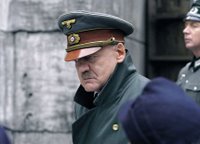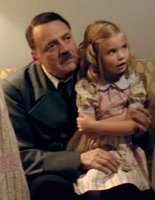munkey's-eye view
 DOWNFALL
DOWNFALL(DER UNTERGANG)
~~~~~~~
'I always make mistakes when I'm dictating.'
~~~~~~~
Oliver Hirschbiegel's film Downfall is a deeply important contribution to the canon of Second World War cinema - a gruellingly in-depth depiction of the final days of Adolf Hitler's reign as Führer of the Third Reich. To give the viewer a way in to the story, the film focusses on Traudl Junge, a young woman we see as an excited young patriot, hired as personal secretary to Hitler in 1943, in the movie's opening sequence. Hirschbiegel then immediately fast-forwards to April 1945, giving us no background or introduction to what has transpired during the War. Prior knowledge of those events is not necessary, as Bernd Eichinger's screenplay seamlessly introduces the important historical players such as Himmler, Speer and Goebbels, and places the viewer viscerally in the midst of a Berlin in ruins as the Red Army bears down.
While Junge is our point-of-view within the walls of Hitler's increasingly chaotic bunker, we are also drawn to follow other characters such as Prof. Dr. Schenck, struggling to provide medical assistance in horrendously gruesome scenes in the sqalid army hospital. Far from being distracting, this multi-protagonist approach grants us a fuller understanding of the dire situation, and allows the rare perspective of feeling profound horror and empathy at the collapse of Germany - almost always (understandably) depicted as the villains in this genre. Indeed Downfall shows that war is populated by despair and devastation on all sides, and even the downfall of an evil dictator like Hitler, has tragic human consequences for the people involved.
 The visual milieu of Hirschbiegel's movie is unrelentingly gritty and realistic. The once-beautiful Berlin tangibly crumbles and explodes before us, while the Führer's bleakly austere bunker compound is a claustrphobic and terrifyingly prison-like setting which feels increasingly - approprtiately - like a trap in which the protagonists are pointlessly condemned to certain death. As all hope fades, and the players begin taking their own lives with shocking resignation, the feeling of despair and futility is palpable.
The visual milieu of Hirschbiegel's movie is unrelentingly gritty and realistic. The once-beautiful Berlin tangibly crumbles and explodes before us, while the Führer's bleakly austere bunker compound is a claustrphobic and terrifyingly prison-like setting which feels increasingly - approprtiately - like a trap in which the protagonists are pointlessly condemned to certain death. As all hope fades, and the players begin taking their own lives with shocking resignation, the feeling of despair and futility is palpable.The performances are flawless throughout, with Alexandra Maria Lara wide-eyed and affecting in the role of Junge as the appalling truth of her situation becomes apparent. Corinna Harfouch is a stand-out as Magda Goebbels, while Juliane Köhler lends irresistable charisma to the inexplicably devoted Eva Braun. But, as one would expect, the film is stolen by Bruno Ganz who is utterly breathtaking as Adolf Hitler. Initially turning down the role, he eventually studied the only known private audio recording of Hitler, practiced his unusual accent with natives of the dictator's hometown, as well as spending extensive time with Parkinson's patients (Hitler's affliction with Parkinson's Disease is now well known). He goes far beyond the iconic appearance and manic public performances, creating a dynamic and multi-layered protagonist. In Ganz's depiction, Hitler is domineering, insecure, brutal, tender, and dazzlingly contradictory. Ultimately, we are watching a man self-destructing - his megalomaniacal hopes utterly dashed, and yet refusing to admit defeat like a petulant child - as he crumbles from a charismatic and uncompromising leader, to a helpless frail old man. It seems an odd thing to say, when discussing a person usually associated with pure evil, but Ganz's performance really is the heart of the film, and perhaps Downfall's only weakness is that it lags a little and continues too long after Hitler's inevitable self-inflicted demise.
 Downfall does not apologise for Hitler. It does not shy away from the opinions he held or the acts he oversaw. But it also refuses to paint a two-dimensional caricature of evil incarnate. We see the Führer's remarkably affectionate treatment of his secretaries, and are shown "Uncle Hitler" happily spending time with the young Goebbels children. We also see him viciously ranting, condemning "traitors" to brutal death and dismissing his own poeople as entirely expendible. When a film provides such an intimate portrait of so historically despised a character, inevitable arguments are raised against the "humanising" of such figures. However this attitude is counterproductive and equates to burying one's head in the sand. Hitler was human. All his henchmen and generals were humans. Traudl Junge - a naïve 22-year-old wooed by the Nazi's impressively patriotic triumphs - was a human who (in her own words) allowed "fate [to] lead me somewhere I didn't want to be". We must confront what history shows us: that human beings are capable of horrific beliefs and actions. As Noam Chomsky said, "The nature of humans allows all kinds of behavior. Every one of us, under some circumstances, could be a gas chamber attendant or a saint."
Downfall does not apologise for Hitler. It does not shy away from the opinions he held or the acts he oversaw. But it also refuses to paint a two-dimensional caricature of evil incarnate. We see the Führer's remarkably affectionate treatment of his secretaries, and are shown "Uncle Hitler" happily spending time with the young Goebbels children. We also see him viciously ranting, condemning "traitors" to brutal death and dismissing his own poeople as entirely expendible. When a film provides such an intimate portrait of so historically despised a character, inevitable arguments are raised against the "humanising" of such figures. However this attitude is counterproductive and equates to burying one's head in the sand. Hitler was human. All his henchmen and generals were humans. Traudl Junge - a naïve 22-year-old wooed by the Nazi's impressively patriotic triumphs - was a human who (in her own words) allowed "fate [to] lead me somewhere I didn't want to be". We must confront what history shows us: that human beings are capable of horrific beliefs and actions. As Noam Chomsky said, "The nature of humans allows all kinds of behavior. Every one of us, under some circumstances, could be a gas chamber attendant or a saint."Today, over the doors of Auschwitz - now a peaceful but gut-wrenching memorial to the millions who died in WWII's unthinkable atrocitities - a plaque states the old adage: "Those that do not learn from history, are destined to repeat it". As Junge looks back on her life, in bookending segments of the film, this is the true message of Downfall's devastating narrative. She shamefully compares her story to that of anti-Nazi martyr Sophie Scholl, who was a similar age and who was sent to the guillotine the same year Junge was hired by the Third Reich. Though absolved by the Nuremberg trials, Junge is unable to forgive her own small part in a dark chapter of human history: Being young or ignorant is no excuse. History marches on, and it is up to each of us to ensure we are informed, reponsible pariticpants.
4½ (out of 5)
Labels: munkey's-eye view




0 Comments:
Post a Comment
<< Home